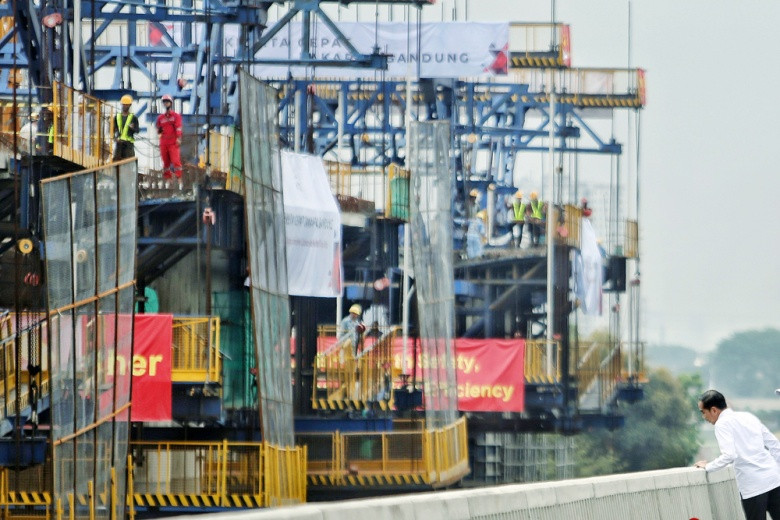Popular Reads
Top Results
Can't find what you're looking for?
View all search resultsPopular Reads
Top Results
Can't find what you're looking for?
View all search resultsCorruption risk to Indonesia’s infrastructure push: Experts
A monopoly by state-owned enterprises (SOEs) weakens the companies’ good corporate governance as it is a certainty that they will get the infrastructure projects as mandated by the government, anti-graft watchdog Indonesia Corruption Watch (ICW) coordinator Adnan Topan Husodo said on Friday.
Change text size
Gift Premium Articles
to Anyone
C
orruption has become one of the risks to the President Joko “Jokowi” Widodo administration’s push to develop Indonesia’s infrastructure to help boost economic growth, experts have said following several arrests of a state-owned construction company’s former employees for alleged embezzlement.
A monopoly by state-owned enterprises (SOEs) weakens the companies’ good corporate governance as it is a certainty that they will get the infrastructure projects as mandated by the government, anti-graft watchdog Indonesia Corruption Watch (ICW) coordinator Adnan Topan Husodo said on Friday.
“The second risk is in the sub-contracting practices as the appointment is prone to corruption,” he said. “Moreover, [infrastructure construction deals] are contracts between government institutions and state companies, which often have vague punishment clauses.”
On Thursday, the Corruption Eradication Commission (KPK) announced that it had detained five former employees of state-owned construction company PT Waskita Karya for alleged appropriations for several fictitious projects between 2009 and 2015 that caused about Rp 202 billion (US$13.89 million) in state losses.
Public Works and Housing Ministry infrastructure financing director general Eko “Heri” Djoeli Heripoerwanto stressed on Saturday that the company remained committed to completing its remaining projects despite the probe, although he refused to comment on the case.
Waskita Karya corporate secretary Shastia Hardiati did not respond to the Post’s requests for comments.
Waskita is not the first state-owned company embroiled in a corruption case. In 2018, the KPK named state-owned construction firm PT Nindya Karya a suspect over alleged corruption during the construction of Sabang port in Aceh.
Infrastructure development has become Jokowi’s economic policy centerpiece during his terms in office as shown in the huge increase in state budget allocation for the cause. The government has increased its infrastructure allocation by 57.3 percent to Rp 423.3 trillion between 2016 and 2020.
The government is also betting on infrastructure to boost economic recovery amid the COVID-19 health crisis as Coordinating Economic Affairs Minister Airlangga Hartarto announced the addition of 89 new projects worth an estimated Rp 1.422 quadrillion in investment to the existing 223 national strategic projects.
However, corruption has been rampant in such projects as the government usually directly appoints state companies to construct the infrastructure.
Read also: Former Waskita Karya officials arrested for alleged embezzlement
The KPK’s 2019 annual report revealed that the agency carried out 26 investigations into suspects linked to state-owned construction companies, the Public Works and Housing Ministry and public works agencies in several regions in Indonesia in the year.
“With their large project budgets and varying stakeholders, infrastructure projects are extremely prone to corrupt practices,” Center of Reform on Economics (CORE) director Mohammad Faisal said on Friday.
He also warned that corruption could dissuade investors from participating in the projects as the government was betting on the Public Private Partnership (PPP) scheme to fund its infrastructure development.
“Reputable private entities will only want to cooperate with their partners, in this case the government, if they trust their track record,” he said. “Investors frown upon a shady deal as it can lead them into legal trouble and take away some of their profit as they need to pay government kickbacks.”
The National Development Planning Agency (Bappenas) has estimated that the country will need infrastructure investment worth $429.7 billion, equal to 6.1 percent of gross domestic product (GDP), between 2020 and 2024. The government can only finance 30 percent of the infrastructure projects using the state budget.
Infrastructure projects could also lose their main function as a support system for economic growth if the projects have poor planning and are completed below standards as a result of corruption despite a gigantic budget, Faisal said.
“Infrastructure projects must be done in accordance with procedure, from planning, tender and implementation to maintenance, in order to ensure their role in empowering the economy,” he said.
“We have to connect infrastructure to the region’s economic priority sector. If there is no connection, the infrastructure will not have any impact on the growth of the local economy,” Faisal added.
Indonesia’s infrastructure ranked 72nd out of 141 countries, according to the World Economic Forum’s 2019 Global Competitiveness Index. Indonesia’s road connectivity was the worst performing aspect, ranking 109th with a score of 59.8 out of 100.
Overall, Indonesia’s global competitive rank slipped five positions from the previous year to 50th, far below Singapore (1st), Malaysia (27th) and Thailand (40th).










